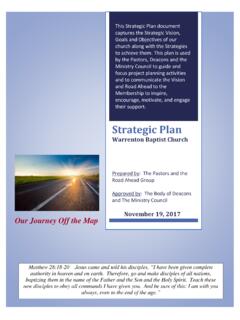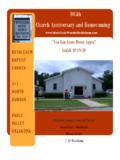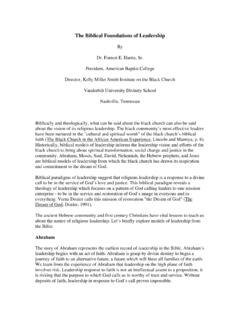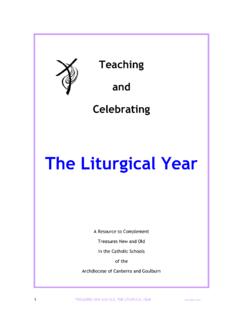Transcription of PASTORAL INSTALLATION SUNDAY
1 PASTORAL INSTALLATION SUNDAY - LECTIONARY COMMENTARY 1 PASTORAL INSTALLATION SUNDAY LECTIONARY COMMENTARY (Please see the sample PASTORAL INSTALLATION service below.) SUNDAY , January 24, 2010 William F. Buchanan, Guest Lectionary Commentator Senior Pastor, Fifteenth Avenue baptist church , Nashville, TN Lection - Ephesians 4:7-13 (New Revised Standard Version) (v. 7) But each of us was given grace according to the measure of Christ s gift. (v. 8) Therefore it is said, When he ascended on high he made captivity itself a captive; he gave gifts to his people. (v. 9) When it says, He ascended, what does it mean but that he had also descended into the lower parts of the earth? (v. 10) He who descended is the same one who ascended far above all the heavens, so that he might fill all things. (v. 11) The gifts he gave were that some would be apostles, some prophets, some evangelists, some pastors and teachers, (v.)
2 12) to equip the saints for the work of ministry, for building up the body of Christ, (v. 13) until all of us come to the unity of the faith and of the knowledge of the Son of God, to maturity, to the measure of the full stature of Christ. I. Description of the Liturgical Moment PASTORAL INSTALLATION SUNDAY - LECTIONARY COMMENTARY 2 The PASTORAL INSTALLATION is a worship celebration of the union between a new pastor and a congregation. Like a wedding, the INSTALLATION becomes a historical marker of the consummation of the covenant between pastor and people. Although the origin of this ritual practice cannot be assigned a specific date, the affirmation and recognition of spiritual leadership (priestly, PASTORAL , or diakonos) to service the needs of the faith community has biblical precedence in the Judeo-Christian tradition (Numbers 8:5-22; Acts 6:1-7, 13:11-13, Galatians 2:9-10).
3 Paul and Barnabas were set apart by the Holy Spirit and the elders in the church at Antioch laid hands on them and sent them off (13:11-13). A PASTORAL INSTALLATION is one of the rich cultural paradigms found among most African American congregational churches. The ritual as practiced is a three-fold event: biblical, communal, and mystical. The Bible is central to the ethos of the ceremony. Many of the elements of the INSTALLATION ceremony, , consecration, prayer, scriptures, etc., are steeped in biblical lore. Second, it is a communal event celebrated within the context of the life of the congregation and the community. Persons from religious, political, and business sectors are invited to participate in the celebration of the new ministry of pastor and people. Finally, it is a mystical event in that the ritual ceremony recognizes and affirms not only the history of God s involvement in salvation history, but also in the life of the congregation both now and in the future.
4 The ceremony is usually done with great pageantry, like most weddings, because it is done with the expectancy that the pastor and church will work together in Kingdom building for many years. II. Biblical interpretation for Preaching and Worship Part One: The Contemporary Contexts of the Interpreter Years ago, at the conclusion of a Doctor of Ministry seminar, as a new pastor, I asked Dr. Samuel Dewitt Proctor what advice he would give a new pastor. His advice was two-fold: As soon as possible set up task force committees to develop a strategic plan for the congregation for your administration. Secondly, every pastor should establish some assumptions of faith to undergird his or her ministry. Assumptions of faith are principle statements that are operative in the preaching, programmatic and administrative ministries of the pastor. I subsequently developed four assumptions of faith, two of which are, God is active and participating in salvation history, and the Kingdom of God is being fulfilled in us.
5 While the congregation calls the pastor and the pastor accepts, the union is not an autonomous decision between two parties, rather a divinely inspired act. I and the congregation I serve have subsequently embraced these principles in our work of ministry. Thus, fundamental to the call of a pastor is the idea that a covenant community under the guide of the Holy Spirit has called its next spiritual leader. When I was installed as pastor of Fifteenth Avenue baptist church fifteen years ago, the theme for the occasion was: Pastor and People: A Union of God. The INSTALLATION ceremony ought to be the affirmation and the consummation of the covenant union (marriage) between pastor and people. Part Two: Biblical Commentary PASTORAL INSTALLATION SUNDAY - LECTIONARY COMMENTARY 3 The Apostle Paul writes this epistle to the church at Ephesus. The letter is catalogued as a prison epistle because it was written during the time of Paul s incarceration in Rome.
6 The book itself has been referred to as a short course in ecclesiology. James Montgomery Boice says of Ephesians, the Book is about the church . But the place it begins is with the work of the Father, Son and Holy Spirit bringing it into being. 1 However, God did not just call the church into being. God continues to exercise authority over the nurture, maturation, and the fulfillment of the purposes of God in the world through the church . The antecedent of today s text is verses 4-6 of chapter four in which the unity of the church has its genesis in the unity of the work of the God Head in the creation and the perpetuation of the church . In verse 6, Paul uses all four times to argue the thorough involvement of the Spirit of God in the life of the church . There is one body and one Spirit, just as you were called to the one hope of your calling, one God and Father of all, who is above all and through all and in all.
7 The Greek concept of through (dia) is something that enters one side of a perimeter and out the other side of it. This idea connotes not only the influence but the affect that the Spirit has on the totality of the church . In other words, as the Spirit operates through the body of believers, the Spirit affects the accomplishment of God s will on earth. Also, Paul says in all! The Spirit operates through (dia) all and in (en) all. The Spirit operates within the perimeter, the boundaries, of each member of the body of Christ. Each member is endowed with the Spirit of Christ. It is to this end that the Spirit has given to each of us gifts according to the measure of Christ s grace. These gifts, pastor notwithstanding, are given for the purpose of equipping the saints, who are also gifted for the purpose of ministry. Therefore, the Apostle Paul is emphatic that the church is the body of Christ and, just as Christ is not fragmented, neither is the church to be fragmented.
8 The church is to exist and work in perfect harmony, carrying out the manifested purposes of God in the world. Although the aim of the church is unity, it is not unity in the absence of diversity; contrarily, the church is many members, but one body church , operating together to fulfill one mission. So, it is to this end that Christ has gifted some to be apostles, some prophets, some evangelist, some pastors and teachers, to equip the saints for the work of ministry, for the building up of the body. There are two noteworthy key words that I shall explore: pastor and equip. The biblical concept of pastor is resident in both the Old and the New Testaments. The Hebrew (Old Testament) word (raa h) for pastor is shepherd (Jeremiah 3:15) and the New Testament (Greek) word Paul uses for pastor (Ephesians 4:11) is poiemeo, shepherd. The biblical metaphor of pastor is shepherd, one who shepherds the people of God.
9 The pastor is to shepherd the flock of God, which means that all of the qualities, , protector, guide, nurturer, etc., resident in the Good Shepherd ought to be resident in the pastor. The second key word, equip, is also translated as train or prepare in the KJV and NIV. The image of equipping is the setting of a broken bone. This image is consistent with the purpose given in the text for the assignment of gifts until the body attains completeness in Christ. It is the fundamental duty of the pastor to equip the saints for the work of ministry, and for the building up of the body. Also, Paul infers (verse 13) that the construction project of building the body of Christ is to continue until the body reaches perfection in Christ Jesus. Thus, the work of the pastor and the congregation is never complete as long as there are believers who are yet babes in Christ. PASTORAL INSTALLATION SUNDAY - LECTIONARY COMMENTARY 4 Finally, the Apostle Paul is clear that the body without the appointment of particular gifts will be fragmented divided and cannot reach its ultimate end in Christ Jesus.
10 Therefore, in the context of the communal it takes the collaborative work of pastor (shepherd) and people for the effective work of ministry and the building up of the body. The work of the pastor is a daunting task and responsibility because the church , God s agency in the world, will be ultimately measured by its effectiveness in the world. We must not underestimate the value of a good pastor to the life of the church . Celebration The good news in this text is that the church , the call of a pastor, and the INSTALLATION ceremony are expressions of grace. The Apostle Paul says: But, each of us was given grace according to the measure of Christ s gift (verse 7). Grace, charis in the Greek, is the idea of undeserved favor, freely given to each one who is in the body of Christ. As each church celebrates the INSTALLATION of a new pastor, they are celebrating a gift of grace.















